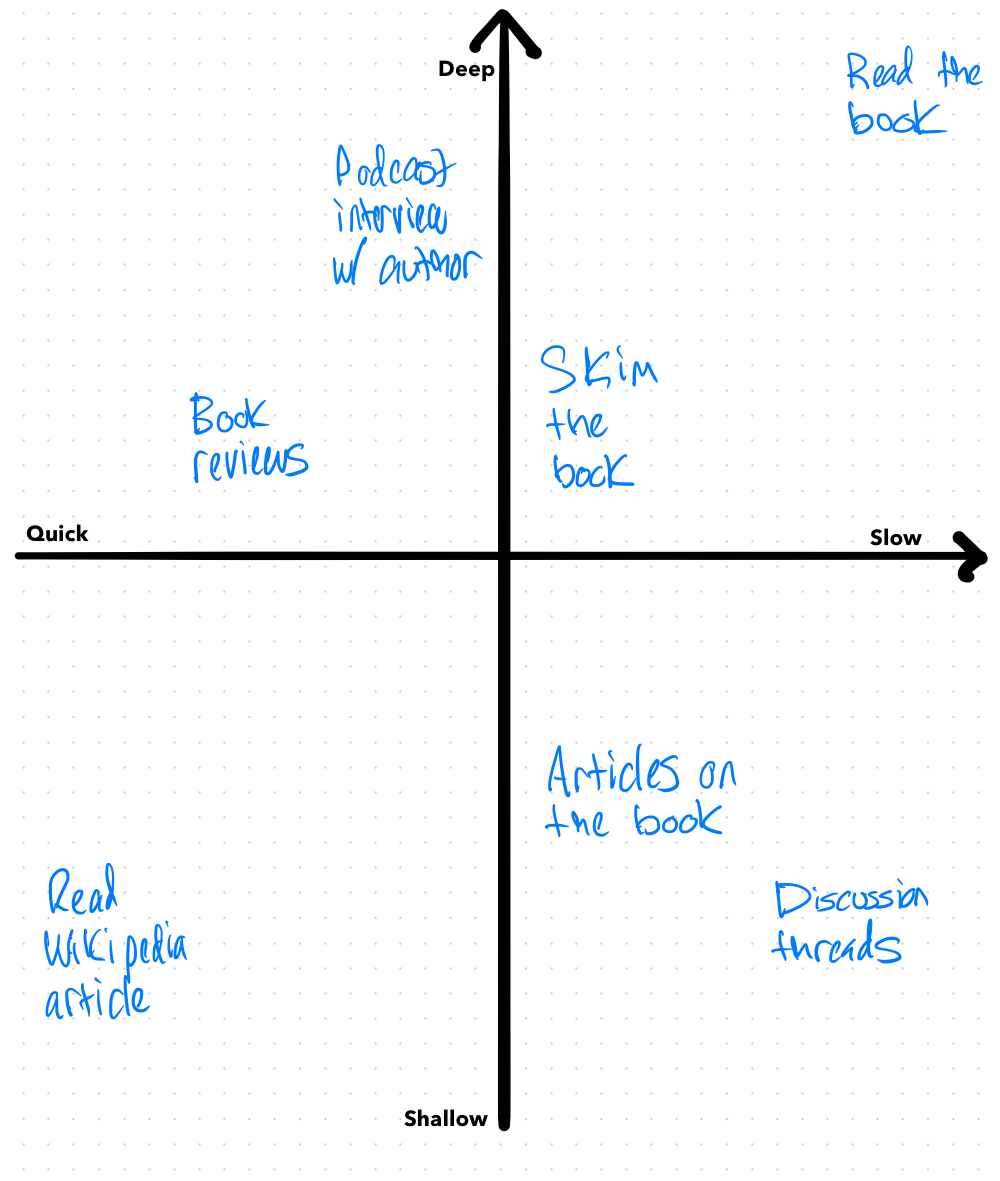I’m drawn to expansive views on a subject. Sprawling narratives are irresistible. Giant books are my weakness. It’s rewarding to finish a chunky, 500-page book but getting there is quite the chore. The more pressing problem is, there are far more tomes out there than I can ever read.
Previously, my strategy for reading large non-fiction tomes has been to 1) slog through them or 2) let them sit around making me feel guilty. Instead of accruing a backlog, I’m looking for opportunities to get the essence of longer books with a smaller investment of time and energy.
Thus, I’ve organized my ideas into a 2x2 diagram to how I’m making tradeoffs and deciding which books to read this year:

Quick and somewhat deep
Interviews with the author on podcasts are often the sweet spot. Podcasts around 60-90 minutes are often enough time to explore the major ideas for the majority of the interview. Often this is as much or more than I’d want to get out of the book in the first place. Plus, a podcast, especially when sped up, is a tiny fraction of the time it takes me to read a short book, let alone a considerable tome. If I finish listening to a good interview wanting more, it’s a great indication that I should the book to the “someday” list.
Book reviews sometimes cover enough of the material in a book to get an idea of whether it’s worth seeking a podcast interview or adding to the “someday” list. Even better, sometimes they more concisely state the whole idea of the book, obviating taking time to read it. This is especially true for topics not known for their depth, e.g. business books.
Quick but shallow
I am probably never going to read War and Peace or Capital. A Critique of Political Economy. Instead, reading the Wikipedia articles on those books gets me in the ballpark or conversation. I think of this as quiz-level literacy: I might remember enough to answer a pub quiz question on these, but I would not be able to debate even the granular points in either of those books with someone who had read them.
On the upside, most Wikipedia articles are less than a ten-minute read; quite the time savings! Sometimes those articles are heavily linked to other topic pages, possibly more useful than reading the actual book when it comes to deep topics like economics, history, or philosophy. On the downside, most Wikipedia summaries are very short, to the point of only indicating an idea is present, rather than exploring it.
Slow yet shallow
Discussion threads on a book (Twitter, Reddit, Internet forums) sometimes yield deep insight or connections about the material in a book. More often, the discussions get sidetracked and it's not about the book I’m interested in anymore.
Articles on books often seem like they would be a perfect balance between depth and time. However, like discussion threads, they tend to spread out into other topics easily. Not necessarily bad, but suboptimal for my purposes.
It would seem like long-form magazine writing on books would be a nice balance point. Reviews and articles on interesting books often pop up in my periodicals or timeline. Mostly, these aren’t as useful as interviews because they weave in and out of the book material and into whatever larger point the writer is trying to make of the book. Nonetheless, a good article on a book indicates either a writer worth reading in the future or a book with “someday” list potential.
Slow and deep
When I really want to go deep, but still don’t know if it’s worth reading every single page, skimming is the answer. Some books are rewarding in-depth but repetitive. The second or third case study backing up an idea or thesis is not as valuable or interesting as the first.
Finally, if the topic and/or author seem worth the time and effort, just read the dang book. It takes time and dedication but yields the best journey. It’s an investment; the reward is proportional to what you put in.
After all these hacks and shortcuts, deciding to read a massive tome ends up being something of a joy. I want to read a Robert Caro book this year, either The Power Broker (definitively a tome) or Working (relatively short). Having read about Caro a bit last year, it seems like I should experience his work at least once. So I’m a little excited to take on the challenge and a little worried it might consume many months of reading time. But I’m pretty sure it’s a worthwhile adventure.